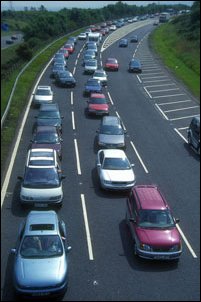You can Beat Car Sickness
Some car travellers have reported being so severely affected that they resorted to unusual methods to cope. Among them are:
Motion sickness occurs when two "motion messages" to the brain are in conflict. One comes from the balance centre of the inner ear, while another comes from the eyes. The brain becomes confused by the discrepancy between sight and sensation when it interprets movement, even though the body isn't actually moving. People suffering from motion sickness often then have some resulting nausea or vomiting. This problem affects some groups more than others. Women are more than twice as likely to be affected as men - particularly during their menstrual cycle. Children between the ages of three and 12 years are also prone to car sickness. The United Kingdom-based RAC Foundation, an organization established to promote the environmental, economic, mobility and safety issues relating to use of motor vehicles, has issued the following advice on how you can prevent your journey from becoming a misery:
People can also buy over-the-counter drugs to prevent motion sickness. Such drugs need to be taken at least 30 to 60 minutes before travelling - but advice on the best type of drug should be sought from a pharmacist. Motorists should always ensure that any drug they take, whether prescription or over-the-counter, has no side affects that could affect their driving ability. Alternative suggestions for combating motion sickness include "acu-pressure bands". Such wristbands have a small plastic bead that puts pressure on the inside of the wrist - preventing the user from experiencing motion sickness. This can be done manually by applying gentle pressure between the two tendons about 3cm or so back from the wrist joint. Herbal remedies may also help. Many people use ginger root to help calm the stomach and thus prevent motion sickness. This can be bought as a tea drink, in capsule form or chewed raw in small slivers.
|
 SOME
of us are more prone to car sickness than others. But whatever the degree of the
affliction, sometimes it can certainly ruin our car trips. Although there is no
cure for motion sickness, it can be prevented in all but some extreme cases.
Passengers are more likely to experience nausea or vomiting than drivers, and it
affects people travelling by road, air or sea.
SOME
of us are more prone to car sickness than others. But whatever the degree of the
affliction, sometimes it can certainly ruin our car trips. Although there is no
cure for motion sickness, it can be prevented in all but some extreme cases.
Passengers are more likely to experience nausea or vomiting than drivers, and it
affects people travelling by road, air or sea.